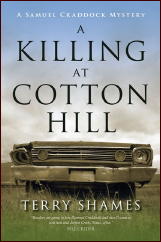Mon 13 May 2013
TERRY SHAMES – A Killing at Cotton Hill. Prometheus Books/Seventh Street Books, trade paperback, July 2013.

Former chief of police Samuel Craddock may be in his sixties, and he may have been forcibly retired from his job in the small Texas town of Jarrett Creek, but he’s still a lot sharper and on the ball than the present man in the position, a good-ol’-boy political appointee named Rodell Skinner.
The death by stabbing of a long time lady friend is also personal, and when Rodell seems all too willing to pin the murder on the woman’s grandson for no other reason than that he’s handy, Craddock decides to un-retire himself, totally unofficially, and see if he can’t make sure justice is done.
A first novel, I believe, and from the first page onward, one that catches your attention and holds it all the way through. While you probably read books like this one for the mystery, and Craddock is by no means a slouch as a detective, if you’re as fond of good writing as I am, it will be the characters in Cotton Hill that will keep the pages turning until late in the evening, or maybe even early into the morning.
Each and every one of the people in this book is a human being, as perfect and as flawed as you or I, starting with Craddock himself, who kicks himself in the butt – hard – for failing to act on the dead woman’s call to him for help the night before her death. As a widower, Craddock has the attention of several ladies (one in particular), and while he’s aware of it, he’s still filled with the memories of his dead wife, and he tactfully manages to avoid further complications in that regard.
The grandson, he discovers, has a great artistic talent, but not so much in the way of social skills. The lady attorney whom he hires to defend the lad he has had issues with in the past, but Craddock soon has to admit that she has more than one arrow in her bow. The other would-be heirs? Well, that’s where the bulk of the suspect pool lies.
The ending, the solution to the mystery, seemed a little rushed to me, but maybe that’s because I was reading faster than I should have. It happens, once in a while, and once again it did this time.
PostScript: I hadn’t decided to mention it until now, but for better or worse, I’ve just decided to. The book is told in first person, present tense, from Craddock’s point of view, and I didn’t discover that the author is female (thanks to the blurb on the back cover of the Advance Reading Copy I read) until 100 pages into the book. Upon a few seconds of reflection, I concluded that I really wasn’t surprised after all.
May 14th, 2013 at 8:34 pm
Steve,
The best thing about your blog is that you find and review hidden gems past and present that I normally wouldn’t know about. This sounds book like something I would really enjoy, and will be reading it when it comes out. Sounds as if a sequel is already in the works. Thank you for letting us know about it.
David
May 14th, 2013 at 8:44 pm
Thanks, David. I’m willing to bet on a second book in the series, too. My only wonder is how many murders can there be in one dinky town in rural Texas? (One small enough that everyone there knows everyone else.)
May 14th, 2013 at 9:04 pm
To answer my own question, there are something like 20 books in Bill Crider’s Sheriff Dan Rhodes series, and they’re still coming.
May 14th, 2013 at 9:19 pm
It would be interesting to see who “jumped the shark” as their series progressed, with the murders getting more and more hard to believe while still keeping the series character around. Louise Penny’s series (which I enjoy) is set in a small town that seemed like it had about 50 people in it, and she is 7 or 8 books into the series. Ted Wood was another one set in a small Canadian town that lasted for a while.
David
May 15th, 2013 at 2:17 am
Maybe they could turn to killing strangers driving through…for material, I mean.
Although , really, the FBI wouild be SWARMING the place in reality !
The Doc